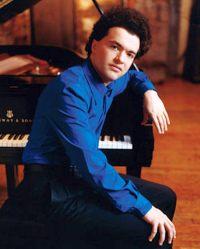
Prokofiev’s Sonata, which closed the first half of the concert, is arguably the least accessible of all of that composer’s sonatas, largely because of its first movement. The uncharacteristically introverted, meandering Andante dolce unfolds slowly, moving through spooky slithers and horrific outbursts toward a final crash. Chopin’s Polonaise-Fantaisie followed the Sonata after the intermission. Similarly to the first movement of Prokofiev’s Sonata, it’s a sprawling mélange of bits and pieces. These fragments come from various sources: the improvisatory prelude, the polonaise, the chorale, the aria, the recitative, and the hymn.
In fact, Chopin even had trouble naming this composition, writing to a friend, “I am finishing something for which I haven’t found a title yet.” Chopin’s contemporaries met the Polonaise-Fantaisie with bewilderment and incomprehension. It was considered to be too shapeless and unbalanced. Even the usually astute Franz Liszt found the work impossible to understand, dismissing it as having “little real value to art.”
In presenting Prokoviev’s Sonata, Kissin did not go out of his way to make the listener’s job easier. He stretched out the slow portions of the first movement to the breaking point, demanding from the coughing audience long spans of unwavering attention. The more lighthearted second movement, Andante sognando, is based on a minuet that Prokofiev originally wrote for an intended, but never realized, theater production of Pushkin’s Eugene Onegin. This movement was also unusually slow, much slower than any minuet known to man, which reminded me of Kissin’s concert at Davies Hall six years ago. Then he played Schubert’s last Piano Sonata in B-flat Major, D. 960, also using extraordinarily slow tempos in the first two movements, Molto moderato and Andante sostenuto.
Yet if in the Schubert Kissin created a highly original, unforgettable interpretation with intensely hypnotic effects, the drawn-out tempos in the first two movements of Prokofiev’s Sonata appeared to be less compelling. The finale of the Sonata, however, was bursting with raw energy and astounding brilliance. Kissin brought the piece to a final volcanic explosion — and was rewarded with a protracted standing ovation even before the intermission.
Astonishing Keyboard Feats
Besides the Polonaise-Fantaisie, the Chopin half of the concert featured three Mazurkas and eight Ètudes. The first Mazurka, in C-sharp minor (Op. 30, No. 4), was one of the highlights of the second half of the program. A dramatic miniballade, it was delivered with heartrending simplicity. All the Ètudes (Op. 10, Nos. 1-4, 12, and Op. 25, Nos. 4, 5, 11) showed Kissin’s dumbfounding technical facility, but there were a few standouts, such as Op. 10, Nos. 4 and 12 (the “Revolutionary”) and Op. 25, No. 11. The most phenomenal, however, was the A-minor Ètude (Op. 10, No. 2). Here the pellucid texture and stylishly shaped lines reached an unmatched perfection.Kissin played other pieces of his Chopin set with considerable charm and polish, though somewhat below his towering standards. Apparently, his recent illness, which forced a rescheduling of the concert for one day later, still had an adverse effect on the pianist.
The concert opened with three delightful pieces from Prokofiev’s ballet Romeo and Juliet. Kissin reveled in the quicksilver, light-footed “Juliet–the Young Girl,” the incisive syncopations of “Mercutio,”‘ and the sinister intensity of “The Montagues and the Capulets.” The seemingly ailing pianist, contrary to his habit, played only two encores, despite numerous stage calls: Chopin’s alluring Nocturne in D-flat Major and Prokofiev’s Diabolical Suggestion, which Kissin deftly managed to make sound both scary and funny at the same time.

